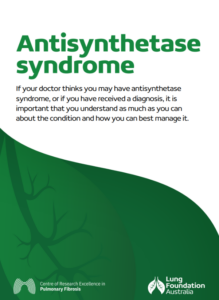The Antisynthetase syndrome resource has been designed to provide an understanding of the causes, symptoms and diagnosis of Antisynthetase syndrome. The resource provides information to support with symptom management and provides an overview of the treatments available.
Antisynthetase syndrome is a rare chronic autoimmune condition that affects multiple parts of the body, including muscles, joints, lungs, skin, and blood vessels. This syndrome is characterised by the immune system attacking the body, leading to inflammation. Symptoms can vary widely among individuals and may include muscle weakness, joint pain, skin rashes, and breathing difficulties. The exact cause of antisynthetase syndrome is unknown, but it is believed to involve the production of specific autoantibodies, such as Anti-Jo-1, that target aminoacyl-tRNA synthetase enzymes due to an overactive immune system.
Diagnosis of antisynthetase syndrome is based on symptoms, medical history, and various tests, including blood tests for autoantibodies, high-resolution CT scans, lung function tests, electromyography, muscle MRI, muscle biopsy, and nailfold capillaroscopy. Treatment aims to reduce inflammation and manage symptoms, as there is no cure for the condition. Options include immunosuppressants like cyclophosphamide and rituximab, corticosteroids, IV immunoglobulins, and plasma exchange. Ongoing treatment may involve corticosteroids, immunosuppressants, anti-fibrotic therapies, and oxygen therapy.
Living with antisynthetase syndrome requires a comprehensive approach to care, which can include participating in pulmonary rehabilitation programs, maintaining a healthy diet and exercise routine, keeping up to date with vaccinations, and considering palliative care if necessary. It is crucial to stay connected with healthcare professionals and seek support when needed to manage the condition effectively.
Receiving a diagnosis of antisynthetase syndrome can be challenging, as it is a serious condition that can cause severe symptoms in some cases. It is important to have a team of health professionals, including respiratory specialists, general practitioners, rheumatologists, physiotherapists, and counsellors, to help manage the condition and ensure the best possible treatment. Coordination with your healthcare team is essential, especially if you have other health conditions.


